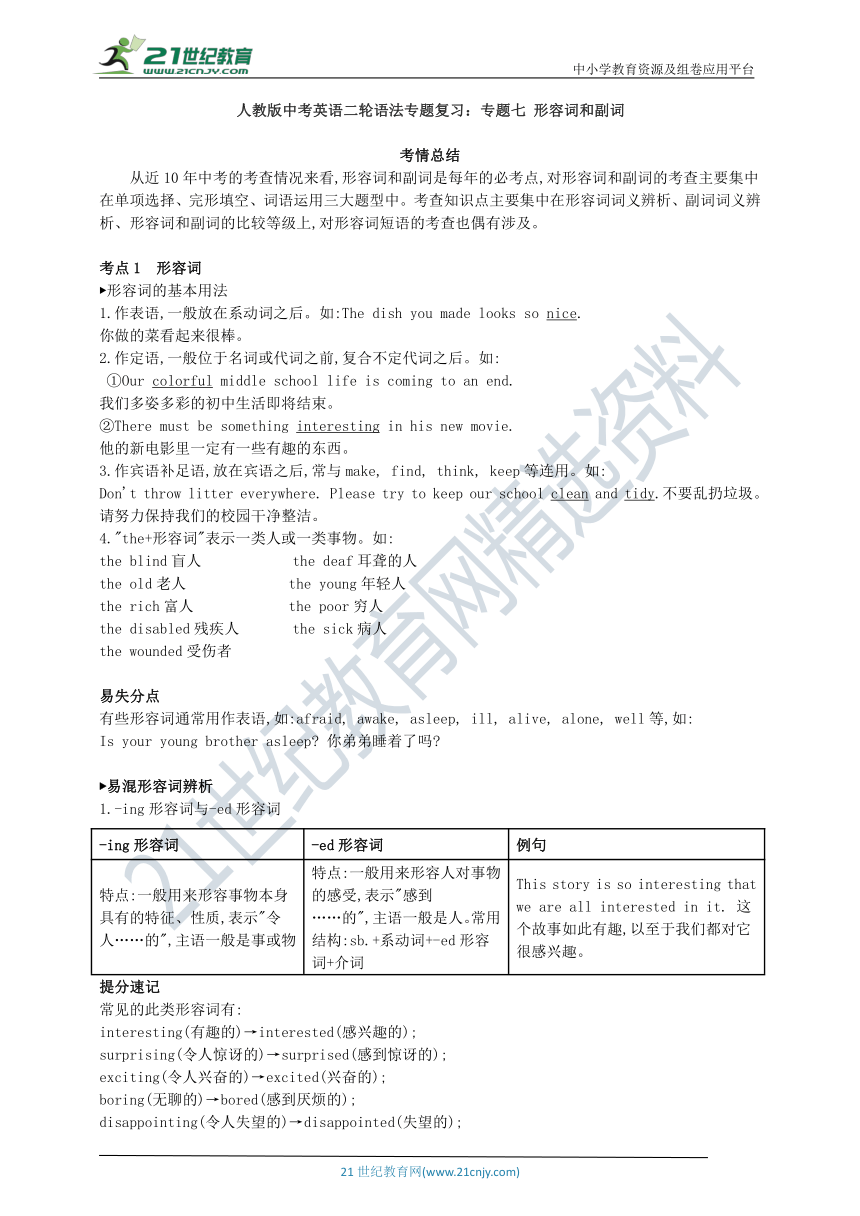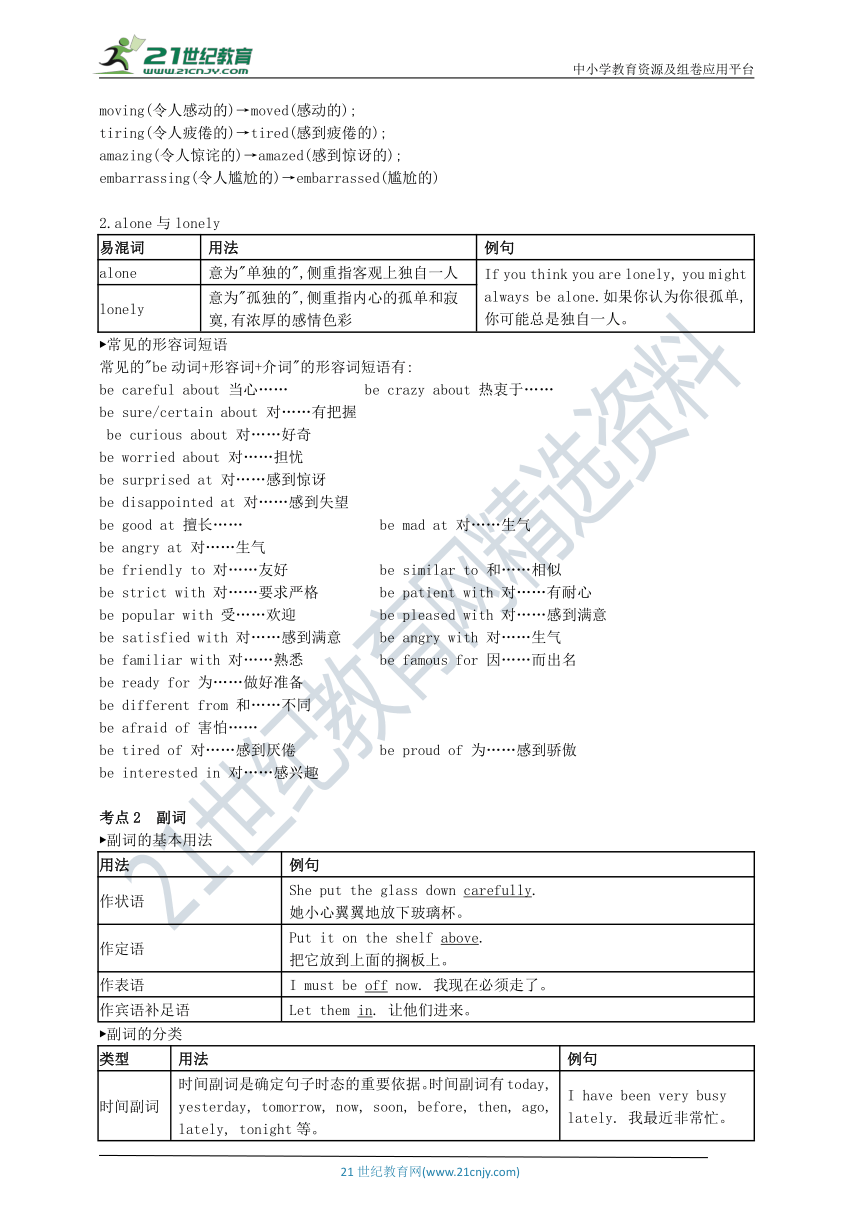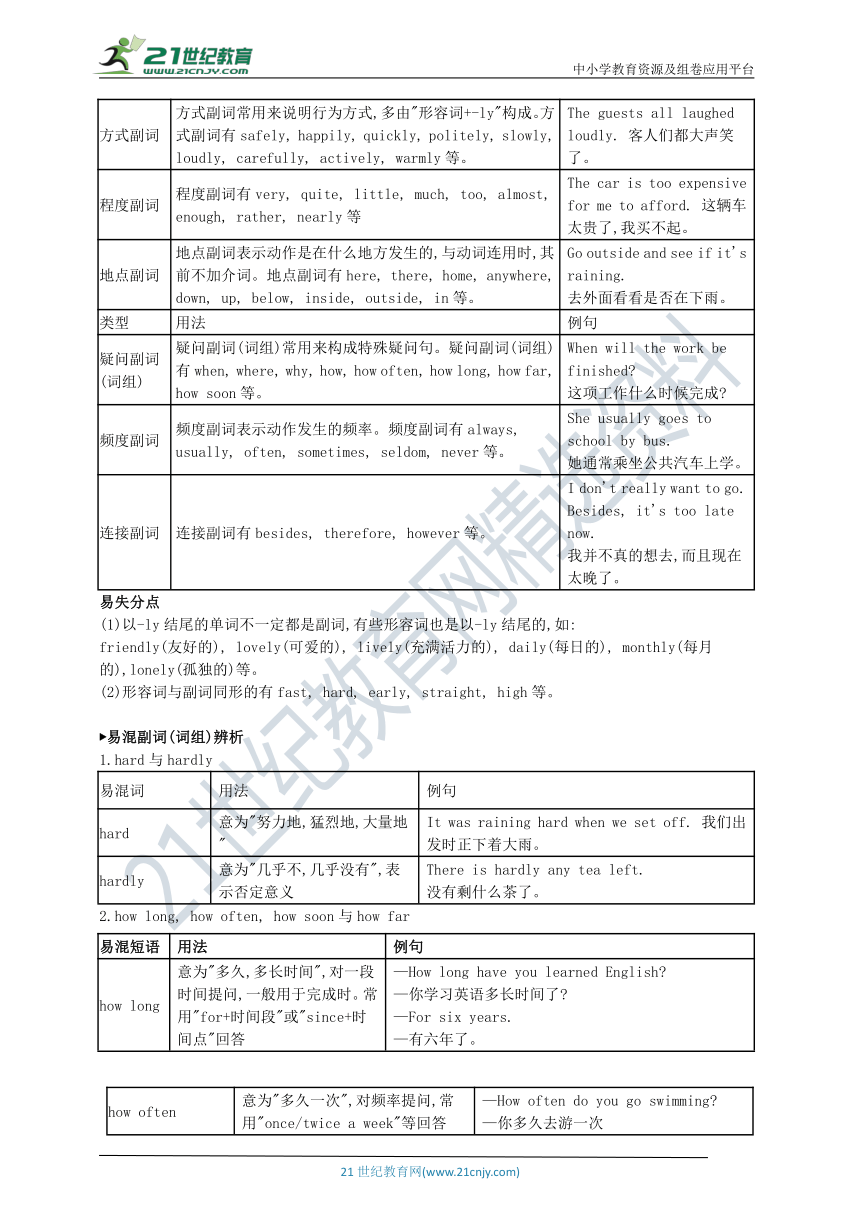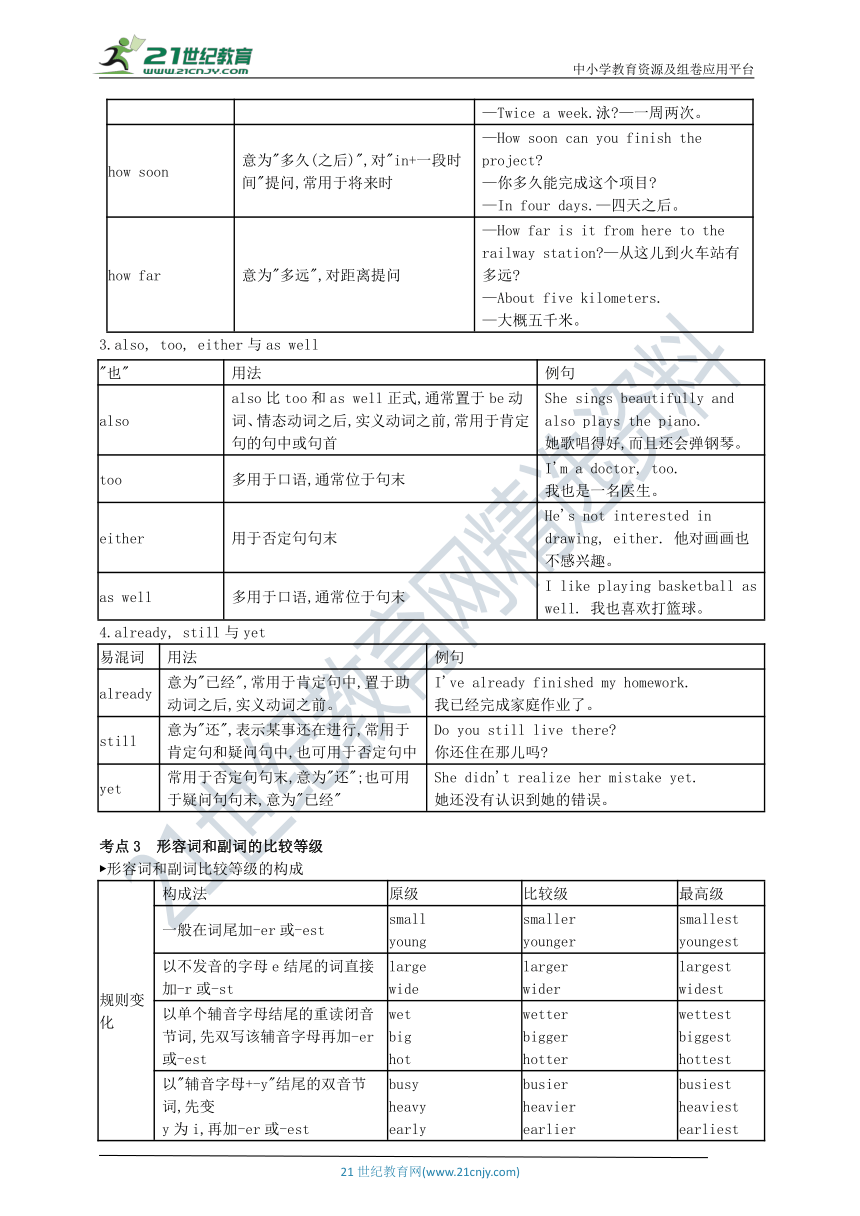人教版中考英语二轮语法专题复习学案:专题七 形容词和副词
文档属性
| 名称 | 人教版中考英语二轮语法专题复习学案:专题七 形容词和副词 |  | |
| 格式 | zip | ||
| 文件大小 | 1.1MB | ||
| 资源类型 | 试卷 | ||
| 版本资源 | 人教新目标(Go for it)版 | ||
| 科目 | 英语 | ||
| 更新时间 | 2019-05-15 17:41:31 | ||
图片预览




文档简介
人教版中考英语二轮语法专题复习:专题七 形容词和副词
考情总结
从近10年中考的考查情况来看,形容词和副词是每年的必考点,对形容词和副词的考查主要集中在单项选择、完形填空、词语运用三大题型中。考查知识点主要集中在形容词词义辨析、副词词义辨析、形容词和副词的比较等级上,对形容词短语的考查也偶有涉及。
考点1 形容词
?形容词的基本用法
1.作表语,一般放在系动词之后。如:The dish you made looks so nice.
你做的菜看起来很棒。
2.作定语,一般位于名词或代词之前,复合不定代词之后。如:
①Our colorful middle school life is coming to an end.
我们多姿多彩的初中生活即将结束。
②There must be something interesting in his new movie.
他的新电影里一定有一些有趣的东西。
3.作宾语补足语,放在宾语之后,常与make, find, think, keep等连用。如:
Don't throw litter everywhere. Please try to keep our school clean and tidy.不要乱扔垃圾。请努力保持我们的校园干净整洁。
4."the+形容词"表示一类人或一类事物。如:
the blind盲人 the deaf耳聋的人
the old老人 the young年轻人
the rich富人 the poor穷人
the disabled残疾人 the sick病人
the wounded受伤者
易失分点
有些形容词通常用作表语,如:afraid, awake, asleep, ill, alive, alone, well等,如:
Is your young brother asleep? 你弟弟睡着了吗?
?易混形容词辨析
1.-ing形容词与-ed形容词
-ing形容词
-ed形容词
例句
特点:一般用来形容事物本身具有的特征、性质,表示"令人……的",主语一般是事或物
特点:一般用来形容人对事物的感受,表示"感到
……的",主语一般是人。常用结构:sb.+系动词+-ed形容词+介词
This story is so interesting that we are all interested in it. 这个故事如此有趣,以至于我们都对它很感兴趣。
提分速记
常见的此类形容词有:
interesting(有趣的)→interested(感兴趣的);
surprising(令人惊讶的)→surprised(感到惊讶的);
exciting(令人兴奋的)→excited(兴奋的);
boring(无聊的)→bored(感到厌烦的);
disappointing(令人失望的)→disappointed(失望的);
moving(令人感动的)→moved(感动的);
tiring(令人疲倦的)→tired(感到疲倦的);
amazing(令人惊诧的)→amazed(感到惊讶的);
embarrassing(令人尴尬的)→embarrassed(尴尬的)
2.alone与lonely
易混词
用法
例句
alone
意为"单独的",侧重指客观上独自一人
If you think you are lonely, you might always be alone.如果你认为你很孤单,你可能总是独自一人。
lonely
意为"孤独的",侧重指内心的孤单和寂寞,有浓厚的感彩
?常见的形容词短语
常见的"be动词+形容词+介词"的形容词短语有:
be careful about 当心…… be crazy about 热衷于……
be sure/certain about 对……有把握
be curious about 对……好奇
be worried about 对……担忧
be surprised at 对……感到惊讶
be disappointed at 对……感到失望
be good at 擅长…… be mad at 对……生气
be angry at 对……生气
be friendly to 对……友好 be similar to 和……相似
be strict with 对……要求严格 be patient with 对……有耐心
be popular with 受……欢迎 be pleased with 对……感到满意
be satisfied with 对……感到满意 be angry with 对……生气
be familiar with 对……熟悉 be famous for 因……而出名
be ready for 为……做好准备
be different from 和……不同
be afraid of 害怕……
be tired of 对……感到厌倦 be proud of 为……感到骄傲
be interested in 对……感兴趣
考点2 副词
?副词的基本用法
用法
例句
作状语
She put the glass down carefully.
她小心翼翼地放下玻璃杯。
作定语
Put it on the shelf above.
把它放到上面的搁板上。
作表语
I must be off now. 我现在必须走了。
作宾语补足语
Let them in. 让他们进来。
?副词的分类
类型
用法
例句
时间副词
时间副词是确定句子时态的重要依据。时间副词有today, yesterday, tomorrow, now, soon, before, then, ago, lately, tonight等。
I have been very busy lately. 我最近非常忙。
方式副词
方式副词常用来说明行为方式,多由"形容词+-ly"构成。方式副词有safely, happily, quickly, politely, slowly, loudly, carefully, actively, warmly等。
The guests all laughed loudly. 客人们都大声笑了。
程度副词
程度副词有very, quite, little, much, too, almost, enough, rather, nearly等
The car is too expensive for me to afford. 这辆车太贵了,我买不起。
地点副词
地点副词表示动作是在什么地方发生的,与动词连用时,其前不加介词。地点副词有here, there, home, anywhere, down, up, below, inside, outside, in等。
Go outside and see if it's raining.
去外面看看是否在下雨。
类型
用法
例句
疑问副词(词组)
疑问副词(词组)常用来构成特殊疑问句。疑问副词(词组)有when, where, why, how, how often, how long, how far, how soon等。
When will the work be finished?
这项工作什么时候完成?
频度副词
频度副词表示动作发生的频率。频度副词有always, usually, often, sometimes, seldom, never等。
She usually goes to school by bus.
她通常乘坐公共汽车上学。
连接副词
连接副词有besides, therefore, however等。
I don't really want to go. Besides, it's too late now.
我并不真的想去,而且现在太晚了。
易失分点
(1)以-ly结尾的单词不一定都是副词,有些形容词也是以-ly结尾的,如:
friendly(友好的), lovely(可爱的), lively(充满活力的), daily(每日的), monthly(每月的),lonely(孤独的)等。
(2)形容词与副词同形的有fast, hard, early, straight, high等。
?易混副词(词组)辨析
1.hard与hardly
易混词
用法
例句
hard
意为"努力地,猛烈地,大量地"
It was raining hard when we set off. 我们出发时正下着大雨。
hardly
意为"几乎不,几乎没有",表示否定意义
There is hardly any tea left.
没有剩什么茶了。
2.how long, how often, how soon与how far
易混短语
用法
例句
how long
意为"多久,多长时间",对一段时间提问,一般用于完成时。常用"for+时间段"或"since+时间点"回答
—How long have you learned English?
—你学习英语多长时间了?
—For six years.
—有六年了。
how often
意为"多久一次",对频率提问,常用"once/twice a week"等回答
—How often do you go swimming?
—你多久去游一次
—Twice a week.泳?—一周两次。
how soon
意为"多久(之后)",对"in+一段时间"提问,常用于将来时
—How soon can you finish the project?
—你多久能完成这个项目?
—In four days.—四天之后。
how far
意为"多远",对距离提问
—How far is it from here to the railway station?—从这儿到火车站有多远?
—About five kilometers.
—大概五千米。
3.also, too, either与as well
"也"
用法
例句
also
also比too和as well正式,通常置于be动词、情态动词之后,实义动词之前,常用于肯定句的句中或句首
She sings beautifully and also plays the piano.
她歌唱得好,而且还会弹钢琴。
too
多用于口语,通常位于句末
I'm a doctor, too.
我也是一名医生。
either
用于否定句句末
He's not interested in drawing, either. 他对画画也不感兴趣。
as well
多用于口语,通常位于句末
I like playing basketball as well. 我也喜欢打篮球。
4.already, still与yet
易混词
用法
例句
already
意为"已经",常用于肯定句中,置于助动词之后,实义动词之前。
I've already finished my homework.
我已经完成家庭作业了。
still
意为"还",表示某事还在进行,常用于肯定句和疑问句中,也可用于否定句中
Do you still live there?
你还住在那儿吗?
yet
常用于否定句句末,意为"还";也可用于疑问句句末,意为"已经"
She didn't realize her mistake yet.
她还没有认识到她的错误。
考点3 形容词和副词的比较等级
?形容词和副词比较等级的构成
规则变化
构成法
原级
比较级
最高级
一般在词尾加-er或-est
small
young
smaller
younger
smallest
youngest
以不发音的字母e结尾的词直接加-r或-st
large
wide
larger
wider
largest
widest
以单个辅音字母结尾的重读闭音节词,先双写该辅音字母再加-er或-est
wet
big
hot
wetter
bigger
hotter
wettest
biggest
hottest
以"辅音字母+-y"结尾的双音节词,先变
y为i,再加-er或-est
busy
heavy
early
busier
heavier
earlier
busiest
heaviest
earliest
其他双音节词和多音节词在其前加more或most
difficult
interesting
important
more difficult
more interesting
more important
most difficult
most interesting
most important
不规则变化
good/well→better→best
bad/badly/ill→worse→worst
many/much→more→most
little→less→least
far→farther/further→farthest/furthest
old→older/elder→oldest/eldest
?形容词和副词的原级比较
1.A+谓语动词+as+形容词/副词原级+as+B 表示双方在程度、性质、特征等方面一样。如:
Your jacket is as new as mine. 你的夹克和我的一样新。
2.A+谓语动词的否定形式+as/so+形容词/副词原级+as+B
表示"A不如B……"。如:
This apple isn't as/so big as that one. 这个苹果没有那个大。
3.A+be动词+倍数+as+形容词原级+as+B 表示"A是B的几倍"。如:
Our classroom is twice as big as theirs. 我们的教室是他们教室的两倍大。
得分巧记
同级比较时,为了避免重复,常用the one, the ones, that, those等词来代替前面出现过的名词。其中the one代替可数名词单数形式,the ones或those代替可数名词复数形式,that代替可数名词单数形式或不可数名词。如:
The pictures on the table are as lovely as those on the wall.
桌子上的画和墙上的画一样漂亮。
?形容词和副词比较级的用法
1.A+谓语动词+比较级+than+B 表示"A比B……"。如:
He works harder than us. 他比我们工作更努力。
2.比较级+and+比较级 表示"越来越……",若比较级是在原级前加more构成的,则用"more and more+原级"表示"越来越……"。如:
①Things are getting better and better. 情况正变得越来越好。
②This song is becoming more and more popular.
这首歌正变得越来越流行。
3.the+比较级...,the +比较级... 表示"越……,越……"。如:
The more careful you are, the fewer mistakes you will make.
你越仔细,所犯的错误就越少。
4.A+谓语动词+less+形容词/副词原级+than+B 表示"A不如B……",相当于"A+谓语动词+not as/so+形容词/副词原级+as+B"。如:
The blue dress is less expensive than the red one.=The blue dress is not as/so expensive as the red one. 这条蓝裙子没有那条红裙子贵。
5.the+形容词比较级+of the two... 表示"两者中较……的"。如:
The taller of the two girls is my sister. 两个女孩中比较高的那个是我姐姐。
6.A+be动词+倍数+形容词比较级+than+B 表示"A比B(大/高/长等)……倍"。如:
Your room is three times bigger than mine. 你的房间比我的房间大三倍。
7.在两者之间进行选择,表示"谁/哪一个更……"时,常用 Who/Which+谓语动词+比较级, A or B? 如:
Who runs faster, Tom or Jerry? 汤姆和杰里,谁跑得快?
提分速记
John is taller than any other student in his class.
约翰比班里其他任何一个学生都高。
=John is taller than the other students in his class.
约翰比班里其他学生都高。
=John is taller than any of the other students in his class.
约翰比班里其他任何一个学生都高。
(2)"否定词+比较级"也可表示最高级的含义。如:
①I have never watched a better movie than this one.
我从来没有看过比这个更好看的电影。
= This is the best movie I've ever watched. 这是我看过的最好看的电影。
②—Do you want to join us to hold a party for our English teacher?
你想加入我们为英语老师举行一场派对吗?
—I can't agree more. 我再同意不过了。
注:一些可用于修饰形容词和副词比较级程度的副词(短语)有:much, a little, even, a lot, a bit, far等。如:
It is much colder today than yesterday. 今天比昨天冷得多。
?形容词和副词最高级的用法
最高级用于三者或三者以上人或事物的比较。在最高级的句型中常用among,in 或of构成的介词短语来指出比较范围。形容词最高级前必须加定冠词the,副词最高级前一般不加定冠词。
1.A+谓语动词(+the)+最高级(+名词)+in/of 短语 表示"A是……中最……
的"。如:
①Tom studies hardest in our class, so he often gets first place in the exam. 汤姆在我们班学习最努力,所以他经常在考试中得第一名。
②He is the strongest player of the group. 他是这组中最健壮的选手。
2.one of+the+形容词最高级+复数名词 表示"最……的……之一"。如:
David is one of the most popular teachers in our school.
戴维是我们学校最受欢迎的老师之一。
3.the +序数词+形容词最高级+名词 表示"第几最……的……"。如:
The Yellow River is the second longest river in China. 黄河是中国第二长河。
4.表示在三者或三者以上的人或事物中进行选择时,用Who/Which+谓语动词(+the)+最高级, A, B or C? 如:
①Who works (the) hardest, Lily, Tony or Mary?
莉莉、托尼和玛丽,谁工作最努力?
②Which is the biggest, the pear, the apple or the peach?
梨、苹果和桃,哪个最大?
易失分点
形容词最高级前有物主代词、指示代词、名词所有格等修饰时,其前不再加定冠词the。如:
Gina is my best friend. 吉娜是我最好的朋友。
专题七 形容词和副词
1.[2018包头]He is a person, but he is good at telling funny stories.?
A. serious B. patient C. kind D. humorous
2.[2018海南改编]Uncle Liang eats out because his wife always makes delicious food for him.?
A. seldom B. sometimes C. often D. always
3.[2018包头]He was once killed in a car accident several years ago.?
A. completely B. sadly C. exactly D. nearly
4.[2018重庆B卷]It rained yesterday. I had to stay at home.?
A. heavily B. quietly C. hardly D. quickly
5.[2018天津]Tianjin is one of cities in China.?
A. big B. bigger C. the biggest D. the bigger
6.[2018江西]—Could I speak to Paul? I phoned .?
—Sorry, he is still in his meeting.
A. late B. earlier C. earliest D. later
7.[2018广东]—What do you think of the movie Operation Red Sea?
—Wonderful. I've never seen a movie than it.?
A. more excited B. more exciting
C. most excited D. most exciting
8.[2018郑州二测]—Our volleyball team achieved great success in the match again.
—Wow! Few could play , I think. ?
A. better B. well C. worse D. badly
9.[2018许昌二模]—Is Paul going to help us?
—Paul? !When I talked to him,he just told me about all the problems he had.?
A. Nearly B. Hardly C. Really D. Always
10.[2018省实验三模]Staying with families and friends in our free time is one of things.?
A. the happiest B. happier C. the happy D. happiest
11.[2018郑州八中三模]—Playing video games is a waste of time.
—I can't agree more. There are meaningful things to do.?
A. the most B. more C. the least D. less
12.[2018平顶山三模]—Another student drowned (溺死) a few days ago.
—What a pity! That's a lesson to us. We must take the rules .?
A. carefully B. silently C. clearly D. seriously
13.The designer was not any of these works, so he decided to create a better one.?
A. pleased with B. famous for C. good at D. busy with
14.—I heard you made a new family rule "Put away your phone while at home".
—Yes. We were busy checking our mobile phones before, but now we enjoy communicating with our family.?
A. always B. never C. seldom D. sometimes
15.There are many beautiful places to visit in Anhui, Mount Huang in autumn.?
A. simply B. finally C. luckily D. especially
16.We can collect rainwater when it rains , and use it to water plants.?
A. softly B. heavily C. noisily D. quietly
17.[2019原创]Nowadays people wish to have food than before as their life improves.?
A. healthy B. healthier C. healthiest D. the healthiest
18.The hotel is very old. It's one of buildings in the city.?
A. old B. older C. oldest D. the oldest
19.[2019原创]—What do you think of the movie?
—Great! I have never seen a one.?
A. good B. bad C. better D. worse
20.[2019原创]You were speaking too fast. Can you speak a little ??
A. more slowly B. most slowly C. more loudly D. most loudly
【参考答案】1—5 AADAC 6—10 BBABA 11—15 BDAAD 16—20 BBDCA
考情总结
从近10年中考的考查情况来看,形容词和副词是每年的必考点,对形容词和副词的考查主要集中在单项选择、完形填空、词语运用三大题型中。考查知识点主要集中在形容词词义辨析、副词词义辨析、形容词和副词的比较等级上,对形容词短语的考查也偶有涉及。
考点1 形容词
?形容词的基本用法
1.作表语,一般放在系动词之后。如:The dish you made looks so nice.
你做的菜看起来很棒。
2.作定语,一般位于名词或代词之前,复合不定代词之后。如:
①Our colorful middle school life is coming to an end.
我们多姿多彩的初中生活即将结束。
②There must be something interesting in his new movie.
他的新电影里一定有一些有趣的东西。
3.作宾语补足语,放在宾语之后,常与make, find, think, keep等连用。如:
Don't throw litter everywhere. Please try to keep our school clean and tidy.不要乱扔垃圾。请努力保持我们的校园干净整洁。
4."the+形容词"表示一类人或一类事物。如:
the blind盲人 the deaf耳聋的人
the old老人 the young年轻人
the rich富人 the poor穷人
the disabled残疾人 the sick病人
the wounded受伤者
易失分点
有些形容词通常用作表语,如:afraid, awake, asleep, ill, alive, alone, well等,如:
Is your young brother asleep? 你弟弟睡着了吗?
?易混形容词辨析
1.-ing形容词与-ed形容词
-ing形容词
-ed形容词
例句
特点:一般用来形容事物本身具有的特征、性质,表示"令人……的",主语一般是事或物
特点:一般用来形容人对事物的感受,表示"感到
……的",主语一般是人。常用结构:sb.+系动词+-ed形容词+介词
This story is so interesting that we are all interested in it. 这个故事如此有趣,以至于我们都对它很感兴趣。
提分速记
常见的此类形容词有:
interesting(有趣的)→interested(感兴趣的);
surprising(令人惊讶的)→surprised(感到惊讶的);
exciting(令人兴奋的)→excited(兴奋的);
boring(无聊的)→bored(感到厌烦的);
disappointing(令人失望的)→disappointed(失望的);
moving(令人感动的)→moved(感动的);
tiring(令人疲倦的)→tired(感到疲倦的);
amazing(令人惊诧的)→amazed(感到惊讶的);
embarrassing(令人尴尬的)→embarrassed(尴尬的)
2.alone与lonely
易混词
用法
例句
alone
意为"单独的",侧重指客观上独自一人
If you think you are lonely, you might always be alone.如果你认为你很孤单,你可能总是独自一人。
lonely
意为"孤独的",侧重指内心的孤单和寂寞,有浓厚的感彩
?常见的形容词短语
常见的"be动词+形容词+介词"的形容词短语有:
be careful about 当心…… be crazy about 热衷于……
be sure/certain about 对……有把握
be curious about 对……好奇
be worried about 对……担忧
be surprised at 对……感到惊讶
be disappointed at 对……感到失望
be good at 擅长…… be mad at 对……生气
be angry at 对……生气
be friendly to 对……友好 be similar to 和……相似
be strict with 对……要求严格 be patient with 对……有耐心
be popular with 受……欢迎 be pleased with 对……感到满意
be satisfied with 对……感到满意 be angry with 对……生气
be familiar with 对……熟悉 be famous for 因……而出名
be ready for 为……做好准备
be different from 和……不同
be afraid of 害怕……
be tired of 对……感到厌倦 be proud of 为……感到骄傲
be interested in 对……感兴趣
考点2 副词
?副词的基本用法
用法
例句
作状语
She put the glass down carefully.
她小心翼翼地放下玻璃杯。
作定语
Put it on the shelf above.
把它放到上面的搁板上。
作表语
I must be off now. 我现在必须走了。
作宾语补足语
Let them in. 让他们进来。
?副词的分类
类型
用法
例句
时间副词
时间副词是确定句子时态的重要依据。时间副词有today, yesterday, tomorrow, now, soon, before, then, ago, lately, tonight等。
I have been very busy lately. 我最近非常忙。
方式副词
方式副词常用来说明行为方式,多由"形容词+-ly"构成。方式副词有safely, happily, quickly, politely, slowly, loudly, carefully, actively, warmly等。
The guests all laughed loudly. 客人们都大声笑了。
程度副词
程度副词有very, quite, little, much, too, almost, enough, rather, nearly等
The car is too expensive for me to afford. 这辆车太贵了,我买不起。
地点副词
地点副词表示动作是在什么地方发生的,与动词连用时,其前不加介词。地点副词有here, there, home, anywhere, down, up, below, inside, outside, in等。
Go outside and see if it's raining.
去外面看看是否在下雨。
类型
用法
例句
疑问副词(词组)
疑问副词(词组)常用来构成特殊疑问句。疑问副词(词组)有when, where, why, how, how often, how long, how far, how soon等。
When will the work be finished?
这项工作什么时候完成?
频度副词
频度副词表示动作发生的频率。频度副词有always, usually, often, sometimes, seldom, never等。
She usually goes to school by bus.
她通常乘坐公共汽车上学。
连接副词
连接副词有besides, therefore, however等。
I don't really want to go. Besides, it's too late now.
我并不真的想去,而且现在太晚了。
易失分点
(1)以-ly结尾的单词不一定都是副词,有些形容词也是以-ly结尾的,如:
friendly(友好的), lovely(可爱的), lively(充满活力的), daily(每日的), monthly(每月的),lonely(孤独的)等。
(2)形容词与副词同形的有fast, hard, early, straight, high等。
?易混副词(词组)辨析
1.hard与hardly
易混词
用法
例句
hard
意为"努力地,猛烈地,大量地"
It was raining hard when we set off. 我们出发时正下着大雨。
hardly
意为"几乎不,几乎没有",表示否定意义
There is hardly any tea left.
没有剩什么茶了。
2.how long, how often, how soon与how far
易混短语
用法
例句
how long
意为"多久,多长时间",对一段时间提问,一般用于完成时。常用"for+时间段"或"since+时间点"回答
—How long have you learned English?
—你学习英语多长时间了?
—For six years.
—有六年了。
how often
意为"多久一次",对频率提问,常用"once/twice a week"等回答
—How often do you go swimming?
—你多久去游一次
—Twice a week.泳?—一周两次。
how soon
意为"多久(之后)",对"in+一段时间"提问,常用于将来时
—How soon can you finish the project?
—你多久能完成这个项目?
—In four days.—四天之后。
how far
意为"多远",对距离提问
—How far is it from here to the railway station?—从这儿到火车站有多远?
—About five kilometers.
—大概五千米。
3.also, too, either与as well
"也"
用法
例句
also
also比too和as well正式,通常置于be动词、情态动词之后,实义动词之前,常用于肯定句的句中或句首
She sings beautifully and also plays the piano.
她歌唱得好,而且还会弹钢琴。
too
多用于口语,通常位于句末
I'm a doctor, too.
我也是一名医生。
either
用于否定句句末
He's not interested in drawing, either. 他对画画也不感兴趣。
as well
多用于口语,通常位于句末
I like playing basketball as well. 我也喜欢打篮球。
4.already, still与yet
易混词
用法
例句
already
意为"已经",常用于肯定句中,置于助动词之后,实义动词之前。
I've already finished my homework.
我已经完成家庭作业了。
still
意为"还",表示某事还在进行,常用于肯定句和疑问句中,也可用于否定句中
Do you still live there?
你还住在那儿吗?
yet
常用于否定句句末,意为"还";也可用于疑问句句末,意为"已经"
She didn't realize her mistake yet.
她还没有认识到她的错误。
考点3 形容词和副词的比较等级
?形容词和副词比较等级的构成
规则变化
构成法
原级
比较级
最高级
一般在词尾加-er或-est
small
young
smaller
younger
smallest
youngest
以不发音的字母e结尾的词直接加-r或-st
large
wide
larger
wider
largest
widest
以单个辅音字母结尾的重读闭音节词,先双写该辅音字母再加-er或-est
wet
big
hot
wetter
bigger
hotter
wettest
biggest
hottest
以"辅音字母+-y"结尾的双音节词,先变
y为i,再加-er或-est
busy
heavy
early
busier
heavier
earlier
busiest
heaviest
earliest
其他双音节词和多音节词在其前加more或most
difficult
interesting
important
more difficult
more interesting
more important
most difficult
most interesting
most important
不规则变化
good/well→better→best
bad/badly/ill→worse→worst
many/much→more→most
little→less→least
far→farther/further→farthest/furthest
old→older/elder→oldest/eldest
?形容词和副词的原级比较
1.A+谓语动词+as+形容词/副词原级+as+B 表示双方在程度、性质、特征等方面一样。如:
Your jacket is as new as mine. 你的夹克和我的一样新。
2.A+谓语动词的否定形式+as/so+形容词/副词原级+as+B
表示"A不如B……"。如:
This apple isn't as/so big as that one. 这个苹果没有那个大。
3.A+be动词+倍数+as+形容词原级+as+B 表示"A是B的几倍"。如:
Our classroom is twice as big as theirs. 我们的教室是他们教室的两倍大。
得分巧记
同级比较时,为了避免重复,常用the one, the ones, that, those等词来代替前面出现过的名词。其中the one代替可数名词单数形式,the ones或those代替可数名词复数形式,that代替可数名词单数形式或不可数名词。如:
The pictures on the table are as lovely as those on the wall.
桌子上的画和墙上的画一样漂亮。
?形容词和副词比较级的用法
1.A+谓语动词+比较级+than+B 表示"A比B……"。如:
He works harder than us. 他比我们工作更努力。
2.比较级+and+比较级 表示"越来越……",若比较级是在原级前加more构成的,则用"more and more+原级"表示"越来越……"。如:
①Things are getting better and better. 情况正变得越来越好。
②This song is becoming more and more popular.
这首歌正变得越来越流行。
3.the+比较级...,the +比较级... 表示"越……,越……"。如:
The more careful you are, the fewer mistakes you will make.
你越仔细,所犯的错误就越少。
4.A+谓语动词+less+形容词/副词原级+than+B 表示"A不如B……",相当于"A+谓语动词+not as/so+形容词/副词原级+as+B"。如:
The blue dress is less expensive than the red one.=The blue dress is not as/so expensive as the red one. 这条蓝裙子没有那条红裙子贵。
5.the+形容词比较级+of the two... 表示"两者中较……的"。如:
The taller of the two girls is my sister. 两个女孩中比较高的那个是我姐姐。
6.A+be动词+倍数+形容词比较级+than+B 表示"A比B(大/高/长等)……倍"。如:
Your room is three times bigger than mine. 你的房间比我的房间大三倍。
7.在两者之间进行选择,表示"谁/哪一个更……"时,常用 Who/Which+谓语动词+比较级, A or B? 如:
Who runs faster, Tom or Jerry? 汤姆和杰里,谁跑得快?
提分速记
John is taller than any other student in his class.
约翰比班里其他任何一个学生都高。
=John is taller than the other students in his class.
约翰比班里其他学生都高。
=John is taller than any of the other students in his class.
约翰比班里其他任何一个学生都高。
(2)"否定词+比较级"也可表示最高级的含义。如:
①I have never watched a better movie than this one.
我从来没有看过比这个更好看的电影。
= This is the best movie I've ever watched. 这是我看过的最好看的电影。
②—Do you want to join us to hold a party for our English teacher?
你想加入我们为英语老师举行一场派对吗?
—I can't agree more. 我再同意不过了。
注:一些可用于修饰形容词和副词比较级程度的副词(短语)有:much, a little, even, a lot, a bit, far等。如:
It is much colder today than yesterday. 今天比昨天冷得多。
?形容词和副词最高级的用法
最高级用于三者或三者以上人或事物的比较。在最高级的句型中常用among,in 或of构成的介词短语来指出比较范围。形容词最高级前必须加定冠词the,副词最高级前一般不加定冠词。
1.A+谓语动词(+the)+最高级(+名词)+in/of 短语 表示"A是……中最……
的"。如:
①Tom studies hardest in our class, so he often gets first place in the exam. 汤姆在我们班学习最努力,所以他经常在考试中得第一名。
②He is the strongest player of the group. 他是这组中最健壮的选手。
2.one of+the+形容词最高级+复数名词 表示"最……的……之一"。如:
David is one of the most popular teachers in our school.
戴维是我们学校最受欢迎的老师之一。
3.the +序数词+形容词最高级+名词 表示"第几最……的……"。如:
The Yellow River is the second longest river in China. 黄河是中国第二长河。
4.表示在三者或三者以上的人或事物中进行选择时,用Who/Which+谓语动词(+the)+最高级, A, B or C? 如:
①Who works (the) hardest, Lily, Tony or Mary?
莉莉、托尼和玛丽,谁工作最努力?
②Which is the biggest, the pear, the apple or the peach?
梨、苹果和桃,哪个最大?
易失分点
形容词最高级前有物主代词、指示代词、名词所有格等修饰时,其前不再加定冠词the。如:
Gina is my best friend. 吉娜是我最好的朋友。
专题七 形容词和副词
1.[2018包头]He is a person, but he is good at telling funny stories.?
A. serious B. patient C. kind D. humorous
2.[2018海南改编]Uncle Liang eats out because his wife always makes delicious food for him.?
A. seldom B. sometimes C. often D. always
3.[2018包头]He was once killed in a car accident several years ago.?
A. completely B. sadly C. exactly D. nearly
4.[2018重庆B卷]It rained yesterday. I had to stay at home.?
A. heavily B. quietly C. hardly D. quickly
5.[2018天津]Tianjin is one of cities in China.?
A. big B. bigger C. the biggest D. the bigger
6.[2018江西]—Could I speak to Paul? I phoned .?
—Sorry, he is still in his meeting.
A. late B. earlier C. earliest D. later
7.[2018广东]—What do you think of the movie Operation Red Sea?
—Wonderful. I've never seen a movie than it.?
A. more excited B. more exciting
C. most excited D. most exciting
8.[2018郑州二测]—Our volleyball team achieved great success in the match again.
—Wow! Few could play , I think. ?
A. better B. well C. worse D. badly
9.[2018许昌二模]—Is Paul going to help us?
—Paul? !When I talked to him,he just told me about all the problems he had.?
A. Nearly B. Hardly C. Really D. Always
10.[2018省实验三模]Staying with families and friends in our free time is one of things.?
A. the happiest B. happier C. the happy D. happiest
11.[2018郑州八中三模]—Playing video games is a waste of time.
—I can't agree more. There are meaningful things to do.?
A. the most B. more C. the least D. less
12.[2018平顶山三模]—Another student drowned (溺死) a few days ago.
—What a pity! That's a lesson to us. We must take the rules .?
A. carefully B. silently C. clearly D. seriously
13.The designer was not any of these works, so he decided to create a better one.?
A. pleased with B. famous for C. good at D. busy with
14.—I heard you made a new family rule "Put away your phone while at home".
—Yes. We were busy checking our mobile phones before, but now we enjoy communicating with our family.?
A. always B. never C. seldom D. sometimes
15.There are many beautiful places to visit in Anhui, Mount Huang in autumn.?
A. simply B. finally C. luckily D. especially
16.We can collect rainwater when it rains , and use it to water plants.?
A. softly B. heavily C. noisily D. quietly
17.[2019原创]Nowadays people wish to have food than before as their life improves.?
A. healthy B. healthier C. healthiest D. the healthiest
18.The hotel is very old. It's one of buildings in the city.?
A. old B. older C. oldest D. the oldest
19.[2019原创]—What do you think of the movie?
—Great! I have never seen a one.?
A. good B. bad C. better D. worse
20.[2019原创]You were speaking too fast. Can you speak a little ??
A. more slowly B. most slowly C. more loudly D. most loudly
【参考答案】1—5 AADAC 6—10 BBABA 11—15 BDAAD 16—20 BBDCA
同课章节目录
- 词法
- 名词
- 动词和动词短语
- 动词语态
- 动词时态
- 助动词和情态动词
- 非谓语动词
- 冠词
- 代词
- 数词和量词
- 形容词副词及其比较等级
- 介词和介词短语
- 连词和感叹词
- 构词法
- 相似、相近词比较
- 句法
- 陈述句
- 一般疑问句和否定疑问句
- 特殊疑问句及选择疑问句
- 反意疑问句
- 存在句(There be句型)
- 宾语从句
- 定语从句
- 状语从句
- 主谓一致问题
- 简单句
- 并列句
- 复合句
- 主谓一致
- 主、表语从句
- 名词性从句
- 直接引语和间接引语
- 虚拟语气
- 感叹句
- 强调句
- 倒装句
- 祈使句
- 句子的成分
- 句子的分类
- 题型专区
- 单项选择部分
- 易错题
- 完形填空
- 阅读理解
- 词汇练习
- 听说训练
- 句型转换
- 补全对话
- 短文改错
- 翻译
- 书面表达
- 任务型阅读
- 语法填空
- 其他资料
